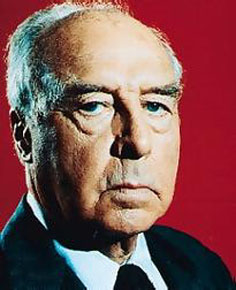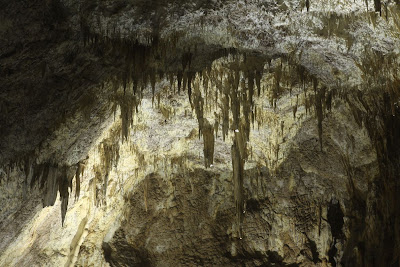John Houseman (born Jacques Haussmann, September 22, 1902 – October 31, 1988) was a Romanian-born British-American actor and film producer. Academy Award-winning actor John Houseman's main contribution to American culture was not his own performances on film but rather, his role as a midwife to one of the greatest actor-directors-cinematic geniuses his adopted country ever produced (Orson Welles) and as a midwife to a whole generation of actors as head of the Julliard School.
Houseman was born in Bucharest, Romania in 1902, the son of a British mother of Welsh and Irish descent and a Jewish father of Romanian ancestry who ran a grain business. He was educated in England at Clifton College, became a British citizen and worked in the grain trade in London before emigrating to the United States in 1925, where he took the stage name of John Houseman. He became an American citizen in 1943.
He directed "Four Saints in Three Acts" for the theater in 1934. Houseman joined with Orson Welles (whom he affectionately called "The Dog-Faced Boy") in 1937 to mount startling productions of the classics in their avant-garde Mercury Theater. Their most important success was a modern-dress version of Shakespeare's "Julius Caesar," in which the spectre of Hitler and Mussolini's Fascist states were evoked. The Mercury Theatre on the Air subsequently became famous for its notorious 1938 radio adaptation of H. G. Wells' The War of the Worlds, which had put much of the country in a panic.
As a producer assigned to Unit 891 of the Federal Theater Project funded by the government's Works Progress Administration, he produced the legendary production "Cradle Will Rock," a musical about the tyranny of capitalism. On Broadway, apart from the Mercury Theatre and the WPA, Houseman directed "The Devil and Daniel Webster" (1939) and "Liberty Jones" and produced "Native Son" (1941). During World War Two, Houseman went to work for the Office of War Information and was involved in broadcasting radio propaganda for the Voice of America. After the war, Houseman returned to directing and produced Metro-Goldwyn-Mayer's 1953 version of Julius Caesar (1953).
Toward what looked like the end of a long career, when he was 66 years old, Mr. Houseman helped establish the school of drama at the Juilliard School and also became the co-founder and longtime artistic director of the Acting Company, the touring repertory group whose alumni include Kevin Kline and Patti LuPone. He resigned as artistic director last summer.
He helped establish the acting program at New York's famous Julliard School for the Arts, where he influenced a new generation of actors. Ironically, he had appeared in only one major movie, in a supporting role, before being tapped to replace James Mason in The Paper Chase (1973). He won an Oscar for the role and began a 15-year career as a highly sought after supporting player (Three Days of the Condor, Rollerball, The Cheap Detective, Ghost Story, My Bodyguard, Naked Gun, Winds of War, Noble House, and many others). Houseman, who wrote three volumes of memoirs, Run-Through (1972), Front and Center (1979) and Final Dress (1983), died in 1988 after making major contributions to the theater and film.
Simona Noja
Simona Noja (born March 9, 1968 in Huedin, Romania) is the Executive Director of the Vienna State Opera Ballet School, and former soloist, dance instructor and co-founder of the ballet school "dance arts" in Vienna. She is known as "the Maria Callas of the ballet".
Noja received training in the Olympic gymnastics team of Romania and studied ballet at the Art Academy in Cluj-Napoca (Romania). She completed a degree in linguistics (Romanian-English) at the University "Babes-Bolyai" in Cluj-Napoca in 1994. Between 1986 and 1991 she was soloist dancer at the Romanian Opera in Cluj-Napoca, and from 1991 to 1995 Soloist at Deutsche Oper am Rhein, Düsseldorf. She joined Vienna State Opera as a principal dancer in 1995.
Simona Noja had acclaimed performances as principal dancer at the Ballet Estable del Teatro Colon (Buenos Aires), Teatro Municipal (Santiago de Chile), Ballet de Cuba (Havana), Bolshoi Theatre (Moscow), La Scala (Milan), Balletto dell'Opera (Rome), Dresden Opera, Teatro San Carlo (Napoli), Royal Swedish ballet (Stockholm), Finnish National ballet (Helsinki), Stuttgart Ballet, Frankfurt Ballet, Bavarian State Opera in Munich.
In 2002 she founded the cultural foundation "Simona Noja," and in 2006 the dance school "dancearts" in Vienna along with her husband, Boris Nebyla. Between 2006-2009 she was a guest teacher at the Vienna Festival ImPulsTanz. In 2009 she founded the company & dance studio theater RenaissDance. Since 2010 she was appointed Executive Director of the Vienna State Opera Ballet School.
Simona Noja won the Silver Medal at the dance competition in Jackson, USA (1990), was voted Best Dancer of the Year by the magazine "Danza e Danza" (2001), and received the Star of Romania (title: Chevalier) (2002) and the Austrian Honorary Cross for Science and Art, First Class (2008).
Images from here
Noja received training in the Olympic gymnastics team of Romania and studied ballet at the Art Academy in Cluj-Napoca (Romania). She completed a degree in linguistics (Romanian-English) at the University "Babes-Bolyai" in Cluj-Napoca in 1994. Between 1986 and 1991 she was soloist dancer at the Romanian Opera in Cluj-Napoca, and from 1991 to 1995 Soloist at Deutsche Oper am Rhein, Düsseldorf. She joined Vienna State Opera as a principal dancer in 1995.
Simona Noja had acclaimed performances as principal dancer at the Ballet Estable del Teatro Colon (Buenos Aires), Teatro Municipal (Santiago de Chile), Ballet de Cuba (Havana), Bolshoi Theatre (Moscow), La Scala (Milan), Balletto dell'Opera (Rome), Dresden Opera, Teatro San Carlo (Napoli), Royal Swedish ballet (Stockholm), Finnish National ballet (Helsinki), Stuttgart Ballet, Frankfurt Ballet, Bavarian State Opera in Munich.
In 2002 she founded the cultural foundation "Simona Noja," and in 2006 the dance school "dancearts" in Vienna along with her husband, Boris Nebyla. Between 2006-2009 she was a guest teacher at the Vienna Festival ImPulsTanz. In 2009 she founded the company & dance studio theater RenaissDance. Since 2010 she was appointed Executive Director of the Vienna State Opera Ballet School.
Simona Noja won the Silver Medal at the dance competition in Jackson, USA (1990), was voted Best Dancer of the Year by the magazine "Danza e Danza" (2001), and received the Star of Romania (title: Chevalier) (2002) and the Austrian Honorary Cross for Science and Art, First Class (2008).
Images from here
Ileana Sonnabend
Ileana Sonnabend (née Schapira, October 28, 1914, Bucharest, Romania - October 2007, New York City) was a dealer of 20th century art.
Her father, a successful businessman, was the financial counselor of King Carol II of Romania. Sonnabend was, for many years, married to Leo Castelli who she met in Bucharest in 1932 and married soon after. The couple had a daughter, Nina Sundell. They went in 1935 to Paris, then she and her husband left Europe in 1941 and settled in New York City.
In 1957 she opened her first art gallery in New York, where exhibited works by Piet Mondrian, Jackson Pollock, Jasper Johns, Robert Rauschenberg. She promoted new artistic trends as Neo-Dada art and Pop Art, showing works by Roy Lichtenstein, Andy Warhol, Claes Oldenburg and James Rosenquist. She ran a contemporary art gallery in Paris during the early 1960s. After leaving Paris, she opened a Sonnabend Gallery in New York City in 1971, at 420 West Broadway, in SoHo, and will make a habit of promoting new forms of art (Minimalism, Arte povera, Conceptual art, Performance, Transavanguardia, Neo-Expressionism, Neo-Geo, New photography) both on Europe and America.
In the late 1999s, the gallery moved to Chelsea and continued to be active until Sonnabend's death. After the death of Ileana, some work in Sonnabend Collection were traded in two auction sales which totaled $ 600 million. The event is considered "the largest private sale of art ever (NY Times)".
Her father, a successful businessman, was the financial counselor of King Carol II of Romania. Sonnabend was, for many years, married to Leo Castelli who she met in Bucharest in 1932 and married soon after. The couple had a daughter, Nina Sundell. They went in 1935 to Paris, then she and her husband left Europe in 1941 and settled in New York City.
In 1957 she opened her first art gallery in New York, where exhibited works by Piet Mondrian, Jackson Pollock, Jasper Johns, Robert Rauschenberg. She promoted new artistic trends as Neo-Dada art and Pop Art, showing works by Roy Lichtenstein, Andy Warhol, Claes Oldenburg and James Rosenquist. She ran a contemporary art gallery in Paris during the early 1960s. After leaving Paris, she opened a Sonnabend Gallery in New York City in 1971, at 420 West Broadway, in SoHo, and will make a habit of promoting new forms of art (Minimalism, Arte povera, Conceptual art, Performance, Transavanguardia, Neo-Expressionism, Neo-Geo, New photography) both on Europe and America.
In the late 1999s, the gallery moved to Chelsea and continued to be active until Sonnabend's death. After the death of Ileana, some work in Sonnabend Collection were traded in two auction sales which totaled $ 600 million. The event is considered "the largest private sale of art ever (NY Times)".
Fortress Valley Cave
Peştera Valea Cetăţii (the Fortress Valley Cave) is located near Râşnov, Braşov County, Southeastern Transylvania, Romania.
The cave was first opened in 1949, when a hydraulic blowup removed a rock and caused a huge flood in the Fundata valley. In 1954, a group of young from Râşnov managed to enter the cave through the opening. Margareta Dumitrescu and Traian Orghidan conducted the first study of the cave complex in 1958 and published a description and a sketch of the cave, indicating its length of 270 m. In 1981, a team from "Emil Racoviţă" speleological club in Bucharest have mapped 857 m with a 36m level difference. In 1988 and 1989 were mapped another 63 m, respectively 38 m, with a level difference of 38.5 m and a development of 958 m. The cave has undergone a continuous process of destruction due to uncontrolled access to various visitors.
Since February 2010, the protected natural area of the Fortress Valley Cave is in the custody of a firm. From this time, the damage of the karstic formations was fortunately stopped, and the cave was set up using the latest technology. The cave was opened for visiting by the public in December 2010 after a titanic work of restoration. Due to the amazing acoustic of the cave, it used also for classical music concerts.
The cave was first opened in 1949, when a hydraulic blowup removed a rock and caused a huge flood in the Fundata valley. In 1954, a group of young from Râşnov managed to enter the cave through the opening. Margareta Dumitrescu and Traian Orghidan conducted the first study of the cave complex in 1958 and published a description and a sketch of the cave, indicating its length of 270 m. In 1981, a team from "Emil Racoviţă" speleological club in Bucharest have mapped 857 m with a 36m level difference. In 1988 and 1989 were mapped another 63 m, respectively 38 m, with a level difference of 38.5 m and a development of 958 m. The cave has undergone a continuous process of destruction due to uncontrolled access to various visitors.
Since February 2010, the protected natural area of the Fortress Valley Cave is in the custody of a firm. From this time, the damage of the karstic formations was fortunately stopped, and the cave was set up using the latest technology. The cave was opened for visiting by the public in December 2010 after a titanic work of restoration. Due to the amazing acoustic of the cave, it used also for classical music concerts.
Photos from here
Subscribe to:
Posts (Atom)















